Euro 2020 qualifying: All you need to know about European Championship qualifiers
- Published
- comments
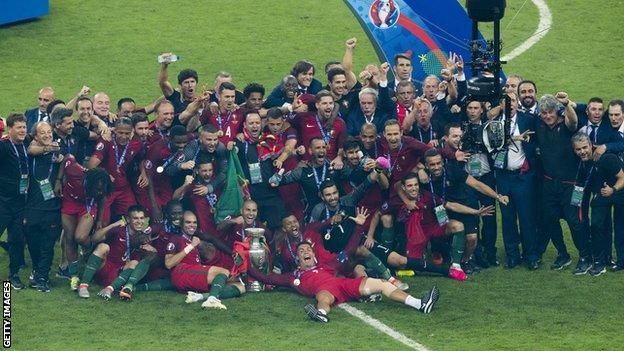
Portugal won Euro 2016 by beating France in the final
Euro 2020 qualifying started on Wednesday with 55 countries battling for 20 spaces at the tournament next year.
How does it all work? Who is looking in good shape? And how does the Nations League tie into this? BBC Sport answers all those questions and more.
What can you tell me about Euro 2020?
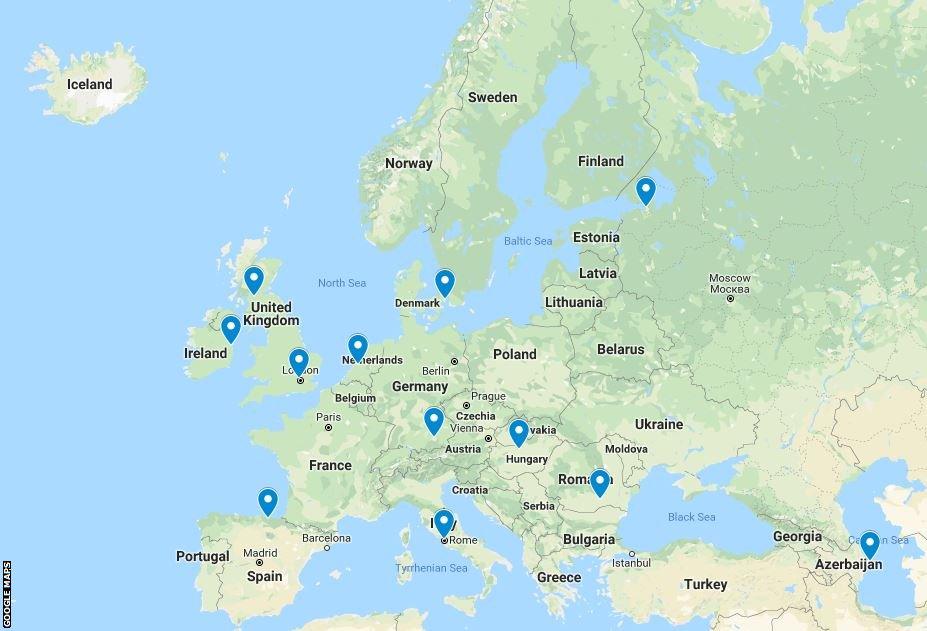
The map shows the 12 different countries across which Euro 2020 will be held
Next year's European Championship, which runs from 12 June to 12 July, will look a lot different to previous versions of the competition.
While we are used to tournaments taking place in a single host nation - or across two countries, as with Poland and Ukraine in 2012 and Austria and Switzerland in 2008 - the 2020 edition will be played out across the continent, with games in 12 countries.
No team automatically qualifies this time, with the games to be held across London, Glasgow, Dublin, Rome, Baku, St Petersburg, Copenhagen, Amsterdam, Bucharest, Bilbao, Munich and Budapest.
The opening match will be played at the Stadio Olimpico in Rome.
Wembley will host seven games - three group matches, one last-16 tie, both semi-finals and the final.
Glasgow's Hampden Park and Dublin's Aviva Stadium will host last-16 matches and three group games. Every host country to qualify will play a minimum of two games at home.
The format of Euro 2020 will be the same as Euro 2016 - six groups of four teams, with the top two and the best four third-placed teams going into the last 16.
How does qualifying work?
There are 10 qualifying groups, of five and six teams, with the top two countries from each group going through automatically.
The first round of qualifiers are on 21-23 March 2019 - and the final games are on 17-19 November 2019. The Nations League finalists, including England, are not in action on matchday two or three in June 2019 so they can play the finals of that tournament.
There are no play-offs after these qualifying groups for third place.
Group A: England, Czech Republic, Bulgaria, Montenegro, Kosovo.
Group B: Portugal, Ukraine, Serbia, Lithuania, Luxembourg.
Group C: Netherlands, Germany, Northern Ireland, Estonia, Belarus.
Group D: Switzerland, Denmark, Republic of Ireland, Georgia, Gibraltar.
Group E: Croatia, Wales, Slovakia, Hungary, Azerbaijan.
Group F: Spain, Sweden, Norway, Romania, Faroe Islands, Malta.
Group G: Poland, Austria, Israel, Slovenia, Macedonia, Latvia.
Group H: France, Iceland, Turkey, Albania, Moldova, Andorra.
Group I: Belgium, Russia, Scotland, Cyprus, Kazakhstan, San Marino.
Group J: Italy, Bosnia-Herzegovina, Finland, Greece, Armenia, Liechtenstein.
But what was that whole Nations League thing about? Where does that fit in now?
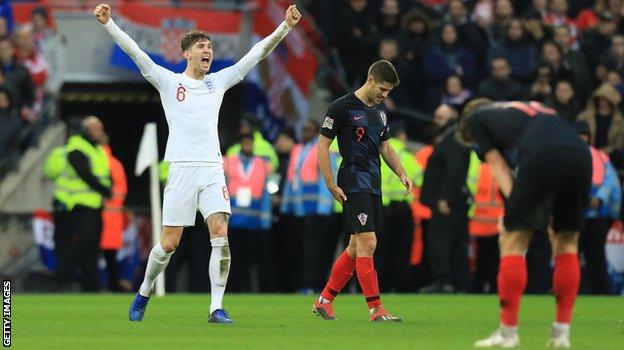
England beat Croatia at Wembley to seal a place at this summer's Nations League finals
The 16 teams who won their three or four-team groups in the Nations League last year guaranteed themselves a Euro 2020 play-off place, against teams of a similar level to themselves, if they fail to finish in the top two places in these upcoming qualifying groups. England and Scotland are among those teams.
If some do qualify for Euro 2020 - which is highly likely - then the next best team in their Nations League tier (in terms of position in their group, points and goal difference) who don't qualify automatically themselves take their play-off place.
The play-off draw is on 22 November 2019, with the semi-finals and finals being played from 26 to 31 March 2020.
These are the teams guaranteed a play-off place at least.
League A: Portugal, England, Switzerland, Netherlands
League B: Ukraine, Denmark, Bosnia-Herzegovina, Sweden
League C: Finland, Norway, Scotland, Serbia
League D: Georgia, Belarus, Macedonia, Kosovo
The Nations League finals - between England, Portugal, Switzerland and the Netherlands - in June this year have no impact on Euro 2020 qualifying.
What are the British and Irish nations' chances of progressing?
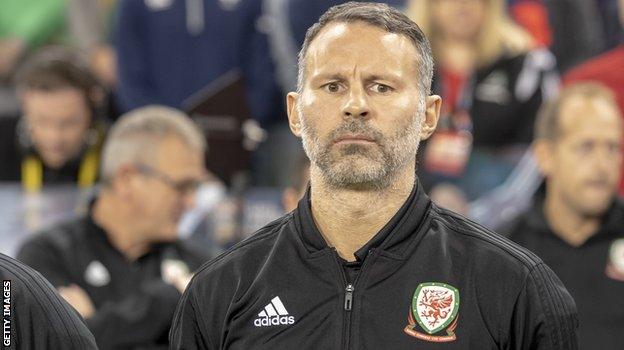
Ryan Giggs' Wales are in the same qualifying group as World Cup finalists Croatia
"It's very cruel, possibly the worst draw we could have got," Northern Ireland boss Michael O'Neill said after being placed with the Netherlands and Germany. Estonia and Belarus are the other teams in their group.
Top-seeded England got a favourable-looking draw, in with the Czech Republic, Bulgaria, Montenegro and Kosovo. Boss Gareth Southgate said "the biggest issue for us in preparing for those games" will be getting the right mentality and dealing with the away atmospheres.
Scotland - who have the safety net of a play-off place - face Belgium, Russia, Cyprus, Kazakhstan and San Marino. "I believe we will have a chance," said manager Alex McLeish.
Wales are in with World Cup finalists Croatia, as well as Slovakia, Hungary and Azerbaijan. "It could be better, it could be worse," said boss Ryan Giggs, adding that "it is masses better" they are in a five-team group.
The Republic of Ireland got fortunate when they should have been drawn in Group C - instead of Northern Ireland - but tournament rules mean only two host countries could be in one Euro 2020 group. That meant they got placed with Switzerland, Denmark, Georgia and Gibraltar instead.
"There was a collective sigh of relief not being in the other group but it's hardly going to be easy," said Mick McCarthy, who starts his second spell as boss of the Republic.
What state are Europe's other leading nations in?
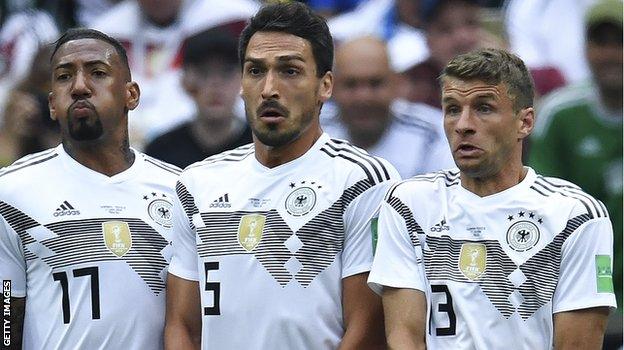
Bayern Munich trio Jerome Boateng, Mats Hummels and Thomas Muller have been told their Germany careers are over
Germany come into qualifying on a low after going out of the group stages at the last World Cup and getting relegated in the Nations League.
Coach Joachim Low took the unusual move of effectively retiring Bayern Munich trio Jerome Boateng, Mats Hummels and Thomas Muller as part of a "new start". The trio, all aged 29 or 30, helped Germany win the 2014 World Cup and have a combined 246 caps.
European champions Portugal are likely to have legend Cristiano Ronaldo back in the team. He sat out the entire Nations League to give him time to adjust to life in Italian football with Juventus, but he says he is now ready to return.
Ronaldo, with 85 goals, is the second top scorer in international history, 24 behind Iran icon Ali Daei.
World champions France are the favourites to win Euro 2020, although they lost their most recent competitive game 2-0 to the Netherlands in the Nations League.
Spain manager Luis Enrique and Italy boss Roberto Mancini take charge of qualifying campaigns for the first time - though both lost matches in the Nations League.
Simon Gleave, head of sports analysis, Gracenote, said: "The top eight nations in Europe according to the Gracenote World Football Ranking - France, Belgium, Spain, England, the Netherlands, Portugal, Germany and Croatia - all have more than an 80% chance of qualifying for Euro 2020.
"Switzerland, Italy, Denmark, Austria, Bosnia-Herzegovina, Poland, Serbia, Russia, the Czech Republic, Wales, Sweden and Turkey are most likely to complete the 20 direct qualifiers for Euro 2020."